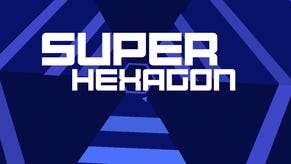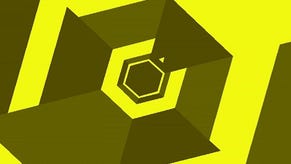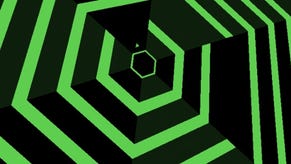Wot I Think: Super Hexagon
Hexa-Gone, Baby, Gone
Ever looking forward, I’ve finally found the time to explore my thoughts about one of last year’s finest. I played Super Hexagon and I loved Super Hexagon, but it wasn’t until I saw it removed from my screen and occurring in a drinking establishment that I found the words I needed.
I was seven or eight pints deep when Super Hexagon finally clicked with me. I’d like to say an excess of fizzy idiot-pop had placed me in my own personal zone, like a PI who cracks a case while spluttering through a mouthful of Wild Turkey tailfeathers, previously unnoticed connections bubbling up in the oak-tinged burn behind his hooded eyes.
I’m no Bogart though. Super Hexagon clicked when I watched somebody else playing, in a bar, my inebriated tunnel vision incapable of seeing anything but the downward spiral and figuring, hey, maybe I’m actually watching The Ascension, or at least an ascension.
The guy was touching screen like a techno concert pianist. I didn’t look at his face - I assume he was either a pre-Raphaelite angel or a helmeted member of Daft Punk - but I’m not convinced that the game even engaged him on a visual level such was his mastery. His eyes could have wandered wherever they chose, although the faces of the hushed onlookers were crowding out everything except the grain of the table surface and the scattered pint pots with their drippy dregs.
Maybe he did look at the swirling abstractions - the twitching, pulsing obstacle course – but I could have sworn he didn't need to. He picked the hexagoniest setting available, nodded his head curtly to signal intent and find the rhythm, and then he dodged and pirouetted, throwing unshaken shapes as if he had been born dancing. He danced, of course, on the four wooden legs of his chair and entirely without motion, except for the spring of a finger.
It was hypnotic. Watching was an honour and I understood how fighting game fans must feel, watching combos expertly strung together and juggles performed to perfection. This is how impressive e-sports champs must look as they micro and macro-ni cheese their way through matches. It was the Yputube video of heavenly bullet hell play and Guitar Hero dominance, but it was happening live, in a bar, on a tiny screen.
I am a Hexagoner, with definite emphasis on the last two syllables, proud when I survive for thirty seconds on the lowest difficulty level, ecstatic when I reach a new portion of the shifting shape. I’ve never quit a session without feeling I’ve made progress though, even if the timely measurements that flicker from the screen might not reflect my learning.
I’ve compared Super Hexagon to Hotline Miami before and I stand by that. The instant punching of the restart button, the immediate erasure of failure, and the presence of enormous difficulties with tiny consequences are common elements of both games. ‘AGAIN’, intoned so sweetly and yet sharply, is alternately needling, urging, encouraging, exasperating, calming, joyous and rewarding.
(edit: it says 'BEGIN' but my silly brain has decided it's 'AGAIN' and refuses to be corrected)
The voice is a reward, at once part of the music and apart from it. It brings me back to myself every few seconds, whether through failure or advancement, and reminds me not to become one with the machine, even though that appears to be the path to ultimate success. Tetsmitho: The Hexaman (NSFMostPlaces). Cut me and I bleed angles.
Sometimes a session will last five minutes and feel like an hour, sometimes two hours will trance by in an instant. I don’t know if Dr Rorschach - whose Wikipedia photo weirdly reminds me of Brad Pitt – was in Terry Cavanagh’s conscious, sub or otherwise, but the shapes in Super Hexagon eventually start to resemble things. Or at least they do when I’m playing, at four o’clock in the morning, haunted by insomniac reveries. If your mind has immediately leapt into a gutter, do not retrieve it. The vantage point is useful. From there you can see the stars, which are pretty and mystifying, but more importantly, you can also see drainage in action.
Oddly, and I really can’t shake this, Super Hexagon has increasingly begun to resemble a living drain into which the various and vitreous humours of my eyes are drawn, like Janet Leigh’s syrup-blood, captured as it spills. And, as in Psycho, the drain and the eye eventually become one. The cuts are quick and brutal, just as in that scene, as famous for Hermann’s contributions as much as Hitchcock’s, but Hexagon’s music doesn’t bleed out on a bassline, it makes the blood pump inward and always toward the heart. COME ON, it synth-shouts, WE’RE IN THIS TOGETHER.
Or maybe that doesn’t work, because maybe the music is the blood, the red thread of life pushed forward by the pulse and the throb. There’s something anatomical about Super Hexagon, that’s all I know, but that’s enough to cling to, the unexpected flotsam in what at first threatens to be a cold machine of a game.
I’m writing about the IGF-nominated masterwork now because there’s a blank space in the RPS archives that’s distinctly Hexagon-like. It’s a challenging game to write about both because it’s experienced in a strange zone that it’s hard to rediscover in words and because its surface-shape is so simple. Press the right buttons at the right times to win. That sure is a description of games, right?
The question is, how much does the rest mean, all of the things that aren’t perfectly timed inputs? If the maestro in the pub was working entirely from memory, as it seemed, the game could be replaced by beeps – push right now, push left now. That, I believe, is where the intensity and brilliance of the design can be found. Remove anything or add anything and Super Hexagon wouldn’t be quite as super. The music, the shapes, the colours, the movement, the precision of control and the speech aren’t quite cogs in a machine, because adding to or subtracting from them wouldn’t break the mechanism; they’re more like voices in a choir. You could modify the choir, you could even adapt pieces into solos or throw in an orchestra, but some pieces can be pitched perfectly without raising the roof.
Super Hexagon sings. Sometimes I applaud a game for the scope of its ambition or the sheer amount of toys it puts in my hands, but the fine edges of Cavanagh’s latest are suggestive of a scalpel-keen focus and adherence to testing and a sort of editorial precision. If it was a thousand-and-some word feature on a glorified blog, Super Hexagon wouldn’t necessarily reach a clear conclusion, but not a word would have been wasted.
No diversions, no tangents; light, sound and interaction, tuned for a perfectly chambered symphony.
Super Hexagon is available now, priced at £1.99.








